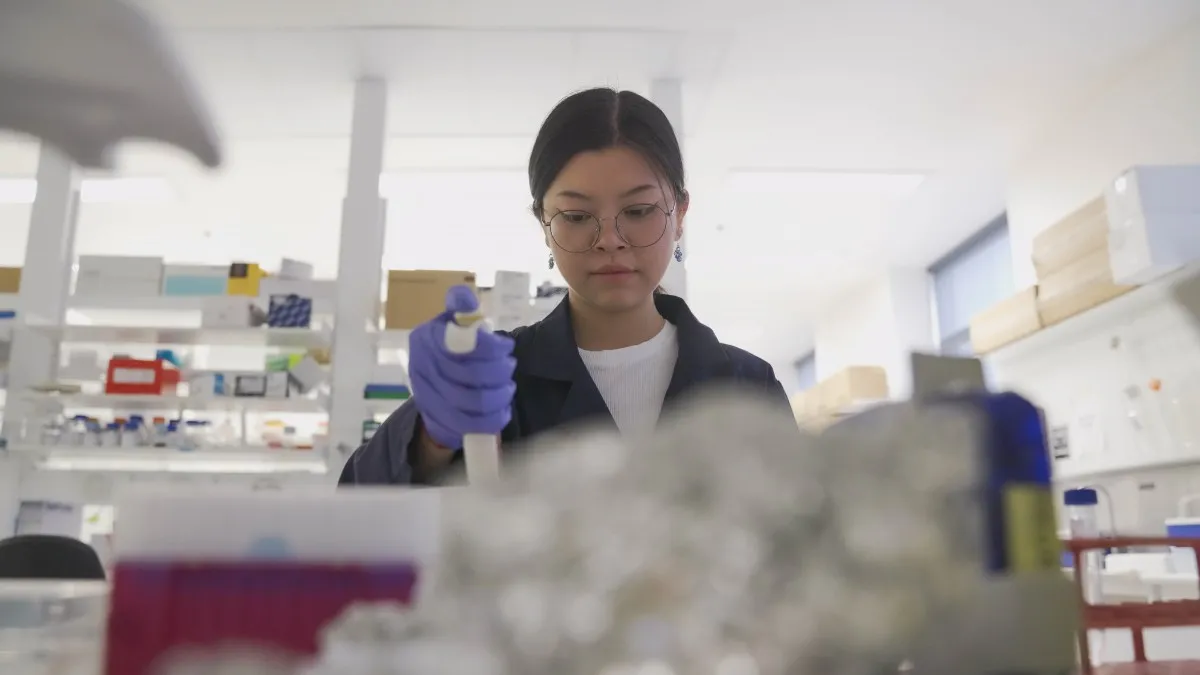Sliding doors moment leads to PhD aimed at improving the lives of patients battling rare diseases

First year PhD student, Yanran Fan, in her lab at the John Curtin School of Medical Research. Photo: Tracey Nearmy/ANU
Yanran Fan didn’t expect to be starting her PhD this year.
She didn’t even expect to be working in medicine.
After completing a double degree in law and medical science, Ms Fan believed she’d become a lawyer or take up a position in policy.
Instead, she pursued her Honours at the John Curtin School of Medical Research (JCSMR).
"I reached a point where another door opened – and it was a whole new world,” Ms Fan said.
“What's really great about doing a PhD is that at the end of it, at the end of the program, it's not that you'll be expected to always go into academia, but instead there are so many different options or paths that you can take.
“And for me, I think once I finish my PhD, there are a lot of options I can choose just purely because of all the different skills and experience that I would have accumulated over the next couple of years of study.
“I could go down the academia route and see where I end up in research, but I could also go into policy ... there are just so many options and I think the next couple of years will be a really great time for me to figure that out.”
Ms Fan said the day usually starts with coffee, but other than that, a day on campus can vary greatly.
She lives on campus at UniLodge, which allows her research to be more flexible.
“We will have days that start very early and I'll be in the lab for the entire day, just moving around, doing experiments, getting a coffee, of course.
“And then there will be the more chill days where I'm just relaxed at my desk, doing some reading, some writing, analysing data.
“I think that variety and flexibility really is what appeals to me about doing research, doing your PhD project at John Curtin, because it gives me that sense of independence, autonomy, and I enjoy having that agency of what my day can look like instead of following a very set routine.”

PhD student Yanran Fan said it was important to create greater awareness of rare diseases. Photo: Tracey Nearmy/ANU
Ms Fan is studying a group of rare immunodeficiencies, and the role that a special type of immune cell – the dendritic cell – plays in certain types of immunodeficiencies.
She was inspired to pursue a PhD after completing an undergraduate research project in the same laboratory.
“Immunodeficiencies aren't talked about as much as we would expect them to be, because they actually do affect a considerable portion of people,” Ms Fan said.
“But they’re hard to study because immunodeficiencies are so different to one another and there's a huge, huge variety of different causes that can contribute to the onset of these immunodeficiencies.
“Immunodeficiencies affect the basic everyday standard of life of patients living with these diseases. They can greatly affect you in the sense that you are extra susceptible to infections by a plethora of different pathogens, including viruses and bacteria.
“In extreme cases, it might mean that you're not able to go outside as often as your peers without suffering an infection. Or it might mean you have to take antibiotics or antimicrobials regularly and all of that will then affect your quality of living quite severely.”
A disease is rare if it affects less than five in 10,000 people.
About 8% of Australians live with a rare disease. This equates to around two million Australians.
Ms Fan said it was important to create greater awareness of rare diseases, including those linked to immunodeficiencies.
Rare Disease Day – held on the last day of February each year – is a globally coordinated movement helping to create greater access to diagnosis and therapies for people living with a rare disease.
"On an educational level, these awareness days play a very important role in terms of making knowledge accessible, and also in communicating the research that we do to the broader public, to those who aren't familiar with the science behind it all,” Ms Fan said.
“On another level, it is the empowerment aspect, because there are only a handful of researchers that are working on these immunodeficiencies and other rare diseases.
“But these awareness days then give everyone the power, regardless of whether they're in research or not. It gives them the power to feel like they're doing something. They're able to contribute in some way to help combat or fight these diseases.”
- Medical research delivers more than novel treatments and diagnostics – it provides hope. Hope that one day patients will not live with the physical, mental and social effects of rare diseases, and hope that we will deliver a world to our grandchildren where they will never know this suffering.
- ANU celebrates all donors passionate about realising a better world through your support of medical research. We invite you to join us in supporting leading research by making a gift today. Give now.
This article first appeared at ANU Health.

